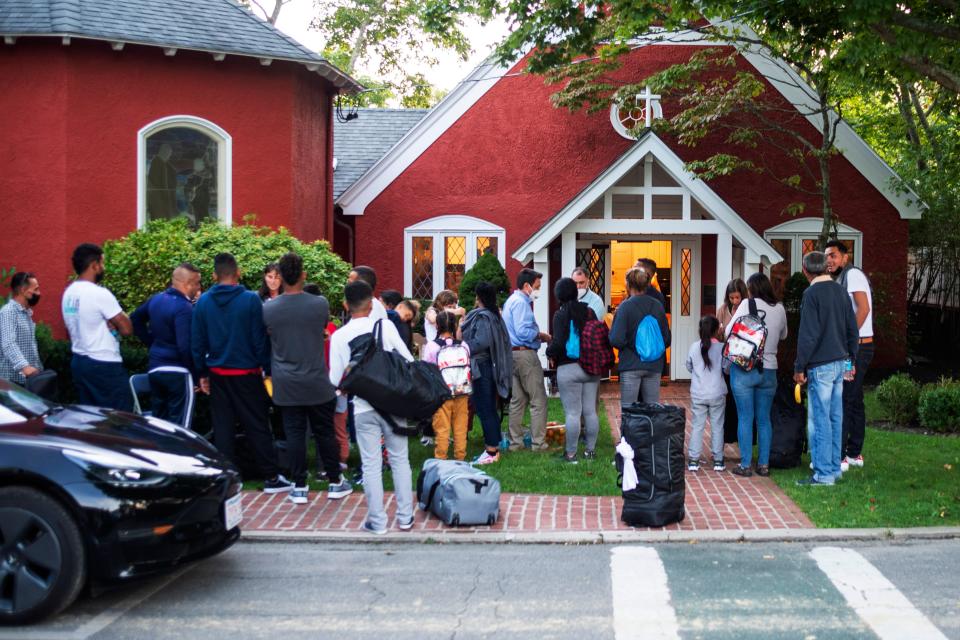Mission Impossible: Immigration reform and the suspension of political disbelief | Opinion
You've seen the move before. In fact, you may have seen it last month in "Top Gun: Maverick" when Tom Cruise's character pilots a fighter jet at incredible speeds past scores of enemy fighters and later just happens upon a functional U.S. plane undamaged in a hangar in an enemy airfield. It takes a willing suspension of disbelief to make this all so appealing. I willingly suspended mine.
We’re mixing Tom Cruise movie metaphors, but today’s political Mission Impossible is bipartisan immigration reform. Can there be no doubt that an open border is not acceptable or sustainable?
This, like so much, is caught deep within the gears of today’s political dysfunction machine. Governors have a lot at stake and a lot of opportunity to help on the margins. But this is a national challenge that has sadly gone unmet for decades. The belief is that this issue is politically unsolvable.
Politicians have tried … and failed
Washington once engaged. The Immigration Reform and Control Act of 1986 was the last gasp of bipartisan cooperation. That was at a time when the Republican Party had a significant constituency who fully understood how newcomers could fill the need for motivated, talented employees. But newcomers must come through a legal process.
The legislation was sponsored by Sen. Alan SImpson, D- Wyoming, and Rep. Romano Mazzoli, D-Kentucky. It was supported by bipartisan majorities in both houses and signed by President Ronald Reagan. It balanced needed security with a process for legalized entry. Over 3 million people were granted permanent residency. The act is widely regarded as a failure. It did not fulfill its intention of discouraging the often exploitive hiring of undocumented workers. Conservative critics pointed to its amnesty as a beacon for more immigrants.
There was one more serious try in 2013. Sen. Marco Rubio, along with others in the “gang of eight” − four Republicans and four Democrats, − advanced a major immigration reform bill through the Senate. However, it failed in the Republican-led House.
Hear more Tennessee voices:Get the weekly opinion newsletter for insightful and thought-provoking columns.
The legislation would have provided border security, made sure foreign workers left the country when their visas expired, put 11 million of those here illegally on a path to citizenship, secure the borders and ensure that foreigners left the United States upon the expiration of their visas. It all fell apart. Rubio stepped back. Immigration reform became impossible, and since then it’s been a recurring policy failure.
First there’s the status of those who came without documentation to the country as children. A majority of Americans favor a path to citizenship for them, but it hasn’t happened. And Rubio, once the Republican spokesperson for change, read the party tea leaves and stepped back behind the curtain..
The issue of immigration reform has become too divisive
Democrats have not exactly embraced immigration as a major line of demarcation between the parties. The issue has simply become too divisive. People want some kind of reform, but there’s no consensus on what that would look like.

Easing a path for citizenship is a persisting, worsening challenge. Millions of those who came illegally and their children are here, working hard and making major contributions. Yes, it is challenging to appear to reward prior illegal behavior. But reality is a compelling concept, and the reality is the status quo is not sustainable. The border is becoming a concept in name only. Another reality is that the country needs the energy and work ethic these newcomers bring.
Ironically, busing newly arrived Venezualians to New York and other cities shows signs of benefiting both the asylum-seekers and communities in need of willing workers. That’s always been the point of common interest that just might encourage a few brave political souls to take on this mission and motivate those in their separate but adjacent theaters to cautiously cheer them on.
There’s an opportunity, if anyone chooses to accept it, for the kind of political heroics that can only come from a willing suspension of political disbelief. And, of course, with a very large dose of courage.
William Lyons is Director of Policy Partnerships for the Howard Baker Jr. Center for Public Policy and Professor Emeritus of Political Science at the University of Tennessee. He also served as Chief Policy Officer for Knoxville Mayors Bill Haslam, Daniel Brown and Madeline Rogero.
The views and opinions expressed are those of the author and do not necessarily reflect the official policy or position of the Howard Baker Jr. Center for Public Policy or the University of Tennessee.
This article originally appeared on Knoxville News Sentinel: Mission Impossible: Immigration reform and the suspension of disbelief

